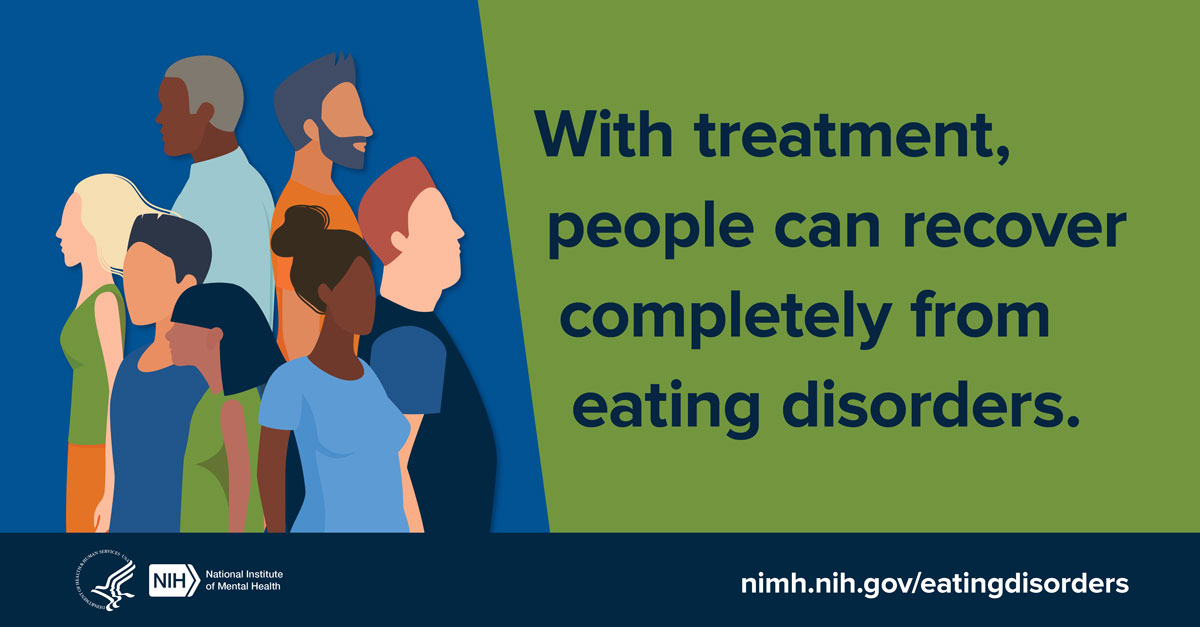By: Rachel Wernicke, Associate Dean and Chief Mental Health Officer, University Life
“Eating disorders are a life-threatening illness that can affect anyone. It doesn’t matter your age, your sex, your ethnicity. Eating disorders don’t discriminate.” – Kesha
Eating disorders can seriously harm the well-being of people who suffer from them. More than 28 million Americans will suffer from an eating disorder at some time in their lives, according to the National Eating Disorders Association. Eating disorders are dangerous – yet they are also treatable. Increasing your awareness about eating disorders, and using these well-being resources for eating disorders, can help you or someone you love on a healing journey.
National Eating Disorders Awareness Week is an annual initiative that provides education about eating disorders and their impacts on individuals and families. This campaign is intended to raise awareness, provide hope and support, reduce shame, and encourage those who are impacted to seek help. In 2023, National Eating Disorders Awareness Week takes place from Monday, February 27 to Sunday, March 5.
What Are Eating Disorders?
There are several different types of eating disorders. Some of the most well-known include:
Anorexia Nervosa, also called anorexia, is a disorder marked by an intense fear of weight gain, low body weight, and distorted perceptions about weight and body shape. People with anorexia are intensely focused on body weight and use extreme measures, including restricting and purging food, to control their weight and shape in ways that can significantly and negatively impact their lives.
Bulimia Nervosa, also called bulimia, is marked by episodes of binging and purging accompanied by feeling a lack of control over eating and a preoccupation with weight and shape. Purging methods may include vomiting after eating, over-exercise, or use of laxatives.
With Binge Eating Disorder,people frequently consume too much food over a specific period of time and feel unable to stop eating despite having a strong wish to do so. They may eat in secret and often feel depressed, disgusted, ashamed, or guilty about their eating. Unlike with bulimia, people with binge-eating disorder do not attempt to get rid of the calories through purging.
While there are differences among specific eating disorders, they can all have severe health consequences. Complications for eating disorders, especially those that are severe or long-lasting, can include: depression and anxiety, suicidality, substance use disorders, significant impacts on work and relationships, major health concerns, and potential death.
Who is at Risk for Developing an Eating Disorder?
It is important to understand that eating disorders can impact anyone. Although there are demographic differences in prevalence for specific diagnoses, eating disorders are not limited to certain categories of age, gender, sexual orientation, race or ethnicity, socioeconomic status, body shape or weight.
Despite the fact that men and racial/ethnic minorities experience eating disorders, they are less likely to seek help. Additionally, assumptions and stereotypes about the type of person who develops an eating disorder can affect access to treatment. For example, people of color tend to be less frequently diagnosed and referred for treatment of eating disorders. In a recent review, researchers cautioned that “under-detection, under-diagnosis, and under-referral for specialist treatment have been documented in men, in people of color, in older individuals in the LGBTQIA+ community, and in individuals living in larger bodies”. Although often assumed to be a disorder associated with financial privilege, some studies show an association between food insecurity (and the fear of not knowing when one will have access to food) and Binge Eating Disorder and Bulimia Nervosa.
Treatment
There are effective treatments available for eating disorders. These treatments usually include a combination of psychotherapy, nutrition education, medical evaluation and monitoring, and medications when needed. Treatment also typically involves addressing health problems related to an eating disorder. For severe disorders that do not respond to standard treatment or if there are significant health complications, treatment in a hospital setting may be necessary.
Educate Yourself and Others about Eating Disorders
Help reduce the stigma associated with eating disorders and seeking help. Please share the message that recovery is possible and help is available. There are resources available for support and treatment.
Be sure to check guidelines for sharing information without causing harm at
Talking About Eating Disorders Safely.
Well-Being Resources for Eating Disorders
Share these resources related to eating disorders with anyone you know who could use them:
- National Eating Disorders Association Helpline: (800) 931-2237
- Eating Disorders Social Media Resources
- NIMH Eating Disorder Publications
- Eating Disorders Screening Tool
- Inclusive Eating Disorder Care
For Mason community members, the following mental health resources are available and can provide referrals when needed.
For Students:
- Counseling and Psychological Services: 703-993-2380
- Crisis Text Line: Text HOME to 741741 to reach a crisis counselor
- TimelyCare
- Mason’s dietician, Brooke Tresch, RD, is available for free consultations with any student to discuss dietary needs, healthy eating, and allergen assistance. Learn more and contact her by filling out this online form.
For Faculty and Staff:
- Employee Relations, Human Resources
- Crisis Text Line: Text HOME to 741741 to reach a crisis counselor
- Center for Psychological Services Emotional Support Line: 703-215-8989
Write one of these Thriving Together Series features! We’re looking for contributions on all topics related to well-being. Read other Thriving Together Series articles here and contact us at cwb@gmu.edu for guidelines. Thank you for helping our Mason community thrive together online!






















